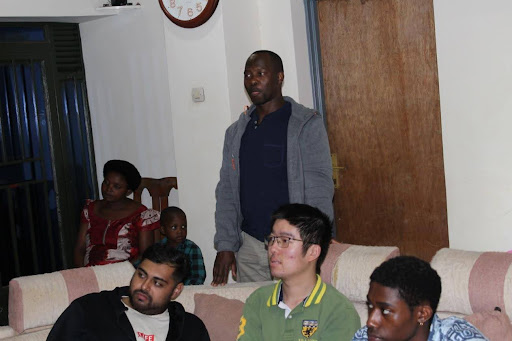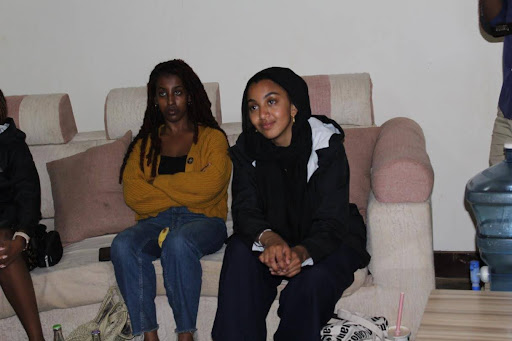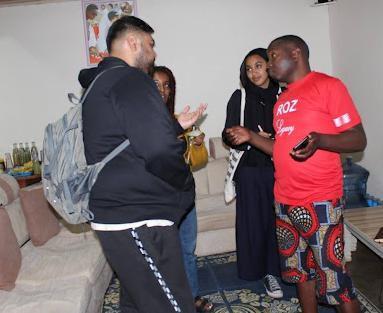
Exploring Eastern Africa: Students Forge Bond with Local NGO
Douglas Kimemia, Ph.D., leads the Eastern Africa Development and Democracy program with political science students, cementing a bond with Rwandan NGO, Home for Hope.
By Frances Burson
VCU Global Education Office Intern
 Richmond, VA (December 15, 2023) - During the 2023 summer break, eight Virginia Commonwealth University students traveled with Douglas Kimemia, Ph.D., assistant professor of political science in the College of Humanities and Sciences, on an education abroad program in Eastern Africa to learn about development and democracy in the region. Over four weeks they traveled to Ethiopia, Rwanda, Uganda, Kenya and Tanzania. In each country, the students met with government officials, policy actors such as parliamentarians, and county or provincial representatives, but during their time in Rwanda, they were able to make a lasting connection with a local non-governmental organization (NGO), Home for Hope.
Richmond, VA (December 15, 2023) - During the 2023 summer break, eight Virginia Commonwealth University students traveled with Douglas Kimemia, Ph.D., assistant professor of political science in the College of Humanities and Sciences, on an education abroad program in Eastern Africa to learn about development and democracy in the region. Over four weeks they traveled to Ethiopia, Rwanda, Uganda, Kenya and Tanzania. In each country, the students met with government officials, policy actors such as parliamentarians, and county or provincial representatives, but during their time in Rwanda, they were able to make a lasting connection with a local non-governmental organization (NGO), Home for Hope.
When they arrived in Rwanda, the students' first stop was the Kigali Genocide Memorial Museum where they learned about the 1994 genocide and its effects on Rwanda and its people. The next day, they went to the home of the founder of Home for Hope, Noel Odenwald, where he educated the students about how he started the organization and what its mission is today.
“Instead of just giving the things you would need for school, like books and a uniform and a backpack, [Home for Hope is] looking at it as a holistic experience to determine what the student needs to be successful, and that means having food on the table, that means having safe transport, whatever it may be,” said Ailita Whalen, a senior majoring in political science. “They manage a small number of students because they try to give each student everything they would need to be successful rather than one piece of the puzzle.”
 Senior political science major, Zachary Ahmad, echoed Whalen’s sentiments while stressing that there is more that Odenwald would like to achieve with his organization.
Senior political science major, Zachary Ahmad, echoed Whalen’s sentiments while stressing that there is more that Odenwald would like to achieve with his organization.
“[Odenwald] wants to do a lot. He has initiatives in health and education and food as well,” said Ahmad. “Right now he helps kids get to secondary school and then they would be on their own. He wants to find a way to get them to the university level and then do a mentorship program where the kids who got through the program could come back and help kids who were just starting” he said.
Odenwald founded Home for Hope in 2015 when he moved to a village just outside of Kigali, Rwanda, and noticed how many children were living in poverty and not receiving an education. As an orphan of the genocide, he decided at that moment that he needed to help these children who were in the same situation as he was growing up. In 2019, Odenwald was able to register his organization as an NGO to further his mission to “bring children from oppression to a life filled with hope and change for an emotionally and physically healthy, successful, and self-sustaining future that can be passed on for generations to come.”
 “Even despite the challenges that they may have gone through, they still showed that drive to overcome it. That stood out to me, that they were resilient in everything that they did and everything that they wanted for Home for Hope,” said Nafisa Hafidh, a VCU senior majoring in political science. “They never felt ‘this is where we stop,’ they never saw a limit toward their goals. They were always like ‘We need to do more, how can we do more?’ [Odenwald] has so many great ideas that are limitless. In a situation where you’re faced with so many obstacles, to have that mentality is very inspiring,” she said.
“Even despite the challenges that they may have gone through, they still showed that drive to overcome it. That stood out to me, that they were resilient in everything that they did and everything that they wanted for Home for Hope,” said Nafisa Hafidh, a VCU senior majoring in political science. “They never felt ‘this is where we stop,’ they never saw a limit toward their goals. They were always like ‘We need to do more, how can we do more?’ [Odenwald] has so many great ideas that are limitless. In a situation where you’re faced with so many obstacles, to have that mentality is very inspiring,” she said.
“Noel’s story was very motivational and impactful. Both of his parents died in the genocide and then he had a sponsor parent. And for him to be able to help people that are in positions that he was in when he was younger, to me that was very impactful,” said Ahmad.
While visiting, the students learned specifically about the Akira Project. The project aims to provide financial and agricultural resources to women in Kigali and the villages nearby through livestock, namely pigs. The women can use the pigs’ fertilizer to grow their gardens, or they can choose to trade the pigs or breed them to help their families financially. The pigs are raised and bred by Odenwald on his family farm.
When the students learned about what Odenwald was doing through the Akira Project, they felt moved to donate. In all, the group donated enough money to secure 11 pigs for families across the region.
After their time with Odenwald at Home for Hope, the students visited sites such as the Rwandan Parliament, the Rwanda Cultural Center and the Ntaraama Genocide Memorial Center. Visiting Home for Hope was a way to see how the effects of the genocide are still prevalent today, and what Rwandan citizens are doing to combat its effects.
“I didn’t know anything about [the Rwandan genocide] before I went, so that was my introduction to it. I was blown away and frustrated by the fact that it’s not super common to know the full story because their whole approach to it afterward, in terms of forgiveness, is mind-blowing,” said Whalen.
“I’d always known about the genocide but I had never met anyone that was directly affected by it. [It was] inspiring for me to see that even though [Odenwald] went through something as heartbreaking as that, he rose above it,” said Hafidh. “He was like, I want something better for myself and I want to make a change for other children who’ve been affected by this.”
Both Whalen and Ahmad felt that this trip and the time spent with Home for Hope positively impacted their academic and professional goals.
“Careerwise I want to join the Peace Corps, international development, nonprofit or embassy work,” said Ahmad “We were able to visit embassies in every country, nonprofits, NGOs and other places. So for me, that gave me further realization that this is something that I really want to do. And having the firsthand experience of being there and meeting people and getting to talk to people at embassies, it cemented what I want to do in the future,” he said.
“As a non-profit minor, it was cool to see the beginnings of a non-profit and the work of one person, and the vision that he has is amazing because he wants it to become more,” said Whalen. “It was a refreshing experience to listen to somebody with such vision about a project but with very few resources,” she said.
For Hafidh, this trip was more than just about fulfilling academic credits; it was a chance to connect with her ancestry.
“I’m ethnically Kenyan, so I wanted to go and understand the histories of my country more in-depth, in a personal sense, and get to understand why their politics are the way they are. Not only in Kenya but in all of East Africa,” said Hafidh.
Kimemia stressed how Home for Hope is still in need of help.
“The thing is, there is still more that we can do. There are specific needs that we, VCU and students in the future, can still do to help with what [Home for Hope] is trying to do. He is still looking out for donors,” Kimemia said. “It’s very small, but he’s able to do all these amazing things. So with more resources, he can reach out to more kids.”
If you are interested in learning more about Kimemia's study abroad program in East Africa, or other study abroad programs and VCU's Peace Corps Prep Certificate, contact the Global Education Office’s Global Learning department (abroad@vcu.edu).
If you are interested in learning more about Home for Hope and would like to donate, visit Home for Hope or contact Kimemia (kimemiadk@vcu.edu) for more information about ways to give.